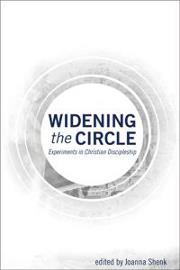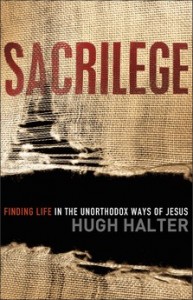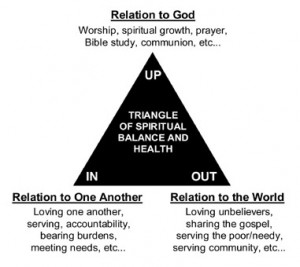Here is the text from today's message dealing with the Scattered and Gathered church as well as the discussion questions that we talked through. Would love to hear your thoughts on the questions as well. Since January we were in a series called STORY, looking at the stories that Jesus told that literally changed the world. We finished that on Easter Sunday we the story of the resurrection of Jesus, and how through the resurrection, Jesus has started the process of recreating all things, to set them to right again.
So today we will be transitioning into a new series that will last until the end of the summer, as we spend the time delving deeper into our Core Values and why we do what we do, and why we gather in the way we gather. We’ll be taking the time to focus on the why and then following that we’ll be again most likely returning to our monthly rhythm.
Today we start the series “Scattered and Gathered” looking at the two natures of the church, through the lens of the OUT, UP, IN Triangle. The two natures of the church are the Scattered Church- that when we scatter into our various life situations (jobs, neighborhoods, school, etc..) believe it or not we are still church. We are just scattered church. The other nature of the church is the gathered church, when we come together as a community to worship, serve, build community, and all that we do when we are together.
So for the next several weeks we are going to look at the Scattered church through the lens of the OUT part of the triangle as well as really push us in both our individual and corporate OUT lives (Launch festival, 1st Friday/Art Walk, Final Survival Kits, etc…) But before we dive to deep into that, I want to unpack the biblical basis for the scattered and gathered church and the OUT, UP, IN of a follower of Jesus’ life.
Let’s look together at the second book in the New Testament called Mark. Mark 6:6b-13 says this, “ Then Jesus went around teaching from village to village. Calling the Twelve to him, he began to send them out two by two and gave them authority over impure spirits. These were his instructions: “Take nothing for the journey except a staff—no bread, no bag, no money in your belts. Wear sandals but not an extra shirt. Whenever you enter a house, stay there until you leave that town. And if any place will not welcome you or listen to you, leave that place and shake the dust off your feet as a testimony against them.” They went out and preached that people should repent. They drove out many demons and anointed many sick people with oil and healed them. “
Now what does this say about the two natures of the church and the OUT, UP, IN life of a disciple? Let’s look at this passage, in particular one verse that, to me, summarizes what each follower of Jesus should be about, as well as what each community of followers of Jesus should be about as well.
In Mark 6 we see Jesus going from town to town preaching the good news of the Kingdom of God. In the passage preceding the one we just read we see Jesus going back to his hometown of Nazareth where he entered the synagogue and began to teach the people gathered there. Unfortunately it didn’t go very well there, as they wonder who he was to teach them about the Kingdom, as he had grown up there, and they all knew his mother, brothers, and sisters. But Jesus didn’t stop there, he continue to go from town to town preaching. In the second half of verse 6 we find that he is becoming an itinerant preacher going from town to town preaching. And while it doesn’t say exactly what he was preaching, we can make an inference by the other gospels and other instances where he taught and preached. The inference we can make is that he was teaching about the reality of the Kingdom of God that was breaking in all around them. (What Jesus taught about the most was the Kingdom of God)
So Jesus, while going from town to town teaching about the Kingdom of God, is training, discipling, and teaching his own 12 disciples what it means to live out the Kingdom of God reality in the midst of their present reality, where it doesn’t seem like the Kingdom is breaking through. They are watching him day in and day out. They see him preach. They see him heal people. They see him interact with religious leaders as well as those who the religious leaders wouldn’t be caught dead with.
So in the midst of all this we bump into verse 7 which says, “Calling the Twelve to him, he began to send them out two by two and gave them authority over impure spirits.” I think it is in this verse we see the 3 parts or 3 relationships (if you will) of a disciples’ life.
The first thing we see in verse 7 is this phrase, “Calling the Twelve to him.” We see this as the first part in the sequence of verse 7. Jesus calls the 12 to him, and, I believe, imparts some learning on them. I believe he took that time to unpack some additional information that they would need when they were sent out to preach the good news of the Kingdom of God themselves. The disciples sat at the feet of Jesus before they got up and sought to do what Jesus was doing. In calling and training them, Jesus was preparing them for the day when he would commission them as his representatives in the world. The disciples were living out the UPWARD dimension of their lives as they spent time listening to, learning and being trained by Jesus.
What about you and I? Have we spent the time at Jesus feet before being sent into the world to “preach” the good news of the Kingdom of God, and the gospel of Jesus? Our UP relationship with Jesus is how we abide in him. As his disciples, we are to model our lives after our Master. We (the branches) must abide in him (the Vine) if we are to produce fruit (John 15). Our efforts are worthless if we do not have the UP in our lives. We will be fruitless with out it.
So after being called to Jesus side, and spending time in the UPWARD part of their relationship with Jesus, we see the next statement, “and began to send them out” This is the OUTWARD dimension of a disciple of Jesus. In the gospel of John, Jesus said, “As the father has sent me, I also send you.” Here Jesus is sending his disciples to do the same things that Jesus did: preaching, healing the sick, and freeing people from demonic possession. In fact, some people call the twelve, the twelve apostles which points at the fact that Jesus had sent them out. In fact the word apostle means one who is sent.” So Jesus sends them out into the world.
You see Jesus never lost sight of his Father’s vision- to reach out to a dark and dying world. He came to seek and save what was lost. He came to love a world that didn’t know what love was. He came to live a life of forgiveness in a world were forgiveness wasn’t practiced. He came to sacrifice self in a world that was all about the self. He lived an outward focused life which was about the other, when every one else around him was only inward focused.
He was calling the disciples to live a sent life, making a difference in the world around them. He is calling us to the same OUTWARD life. To care about the world around us, more than we care about ourselves. To bring light to a dark place, love to a place where there is no love, hope to a place without hope, and joy to a place with no joy. To be individuals and a community that bring so much blessing to the community, that the community would grieve if you (or I) or our community suddenly left the community. That’s what it means to be sent out, to live an OUTWARD life.
Lastly, we see this phrase in verse 7, “two by two”. Jesus knew that they couldn’t do it alone. They needed each other for encouragement, strength, and friendship to be about the mission of the Kingdom of God. Also Jesus was probably referencing the Old Testament law of having two witnesses to collaborate a report. Deuteronomy 19:15 says, “One witness is not enough to convict a man accused of any crime or offense he may have committed. A matter must be established by the testimony of two or three witnesses.” The smallest indivisible unit in the Kingdom of God is two. Jesus practiced this principle in his own life, and he taught it to his disciples. He did not send the disciples out alone to do the work he taught them. We see it in verse 7 but we also see it through the life and ministry of Jesus including when Jesus sent for a donkey, two disciples were dispatched to lead the animal back. Jesus’ followers were not meant to be Lone Rangers. We were designed to have an INWARD life as well.
We see in this passage, and many others within the Bible, the fact that we find ourselves and true fulfillment not in isolation, not even as we engage with one another, but rather when we relate to God through one another. The challenge for the church is to emphasize the communal nature of the Christian faith and to commit to authentic expressions of that nature.
Jesus, in this passage, promotes the understanding that church is both scattered (scattered into the world to make a difference and be a blessing), and gathered (gathered to worship, work, pray, fellowship, share, etc..). That we aren’t just church right here and right now. We are church on Monday morning at 9 AM, or Wednesday afternoon at 2 PM, just as much as we are church on Sunday at 10:30 AM. And we see it, as I have been unpacking, best in verse 7 which spells out the 3 Dimensional Life that we as individuals and as a community should be living out (UP, OUT, IN).
But what does that mean on the ground, in the everyday that we live. What does it look like when the rubber hits the road? These are the questions that we are going to unpack together in our time of conversation and discussion.
Discussion Questions: 1. What are your thoughts, comments, insights, questions, push back, on the message and the Scriptures that we just looked at? 2. Which one of the 3 Dimensions do you struggle the most with (OUT, UP, IN)? Why? Which one comes most naturally to you? Why? 3. As you look at our community, which one do we struggle with? Which one do we "excel" in? 4. Share some concrete ways of growing in all 3 areas both individually and corporately.












